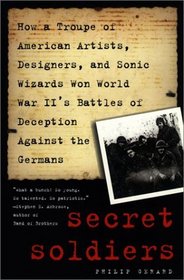I've always been fascinated by the "secret side" of war. By this I mean the codes, code breaking, spies, guerrillas, and especially the falsehoods some armies use to convince the other side to do or not do something. Believe it or not, there is a lot of work in pretending to do something so the enemy thinks and does something you want him to.
The two thousand men who served, at one time or another, in the U.S. Army 23rd Headquarters Special Troops, during World War II, were never given the right to wear the Combat Infantryman's Badge, even though almost all were under enemy fire, often artillery, at some point during the 18 months the unit existed. This was because their efforts were counted in the negatives. Their achievements were in how many American and British men DIDN'T DIE because of the 23rd's efforts.
Just as an example, when the 9th U.S. Army crossed the Rhine in a massive operation, the total casualties for the crossing was only 31 men. This was because the 23rd had the German convinced the crossing was going to be made 30 miles up the river.
When one of the members of the unit was a POW camp guard at the end of the war, he met a German NCO from a unit that didn't attack at a weak point in the American lines. He told the German that the tanks, artillery and men "opposing them" were just rubber fakes and fake noise. The German adamantly maintained, "No! No! That's not true! I saw them with my own eyes---it was the real thing."
So the best tribute to the 23rd's efforts came from the enemy themselves. For decades after the war, the men were not allowed to tell anyone what they did. This book changes that.
The unit's Wikipedia page is at https://en.wikipedia.org/wiki/Ghost_Army .
The two thousand men who served, at one time or another, in the U.S. Army 23rd Headquarters Special Troops, during World War II, were never given the right to wear the Combat Infantryman's Badge, even though almost all were under enemy fire, often artillery, at some point during the 18 months the unit existed. This was because their efforts were counted in the negatives. Their achievements were in how many American and British men DIDN'T DIE because of the 23rd's efforts.
Just as an example, when the 9th U.S. Army crossed the Rhine in a massive operation, the total casualties for the crossing was only 31 men. This was because the 23rd had the German convinced the crossing was going to be made 30 miles up the river.
When one of the members of the unit was a POW camp guard at the end of the war, he met a German NCO from a unit that didn't attack at a weak point in the American lines. He told the German that the tanks, artillery and men "opposing them" were just rubber fakes and fake noise. The German adamantly maintained, "No! No! That's not true! I saw them with my own eyes---it was the real thing."
So the best tribute to the 23rd's efforts came from the enemy themselves. For decades after the war, the men were not allowed to tell anyone what they did. This book changes that.
The unit's Wikipedia page is at https://en.wikipedia.org/wiki/Ghost_Army .




